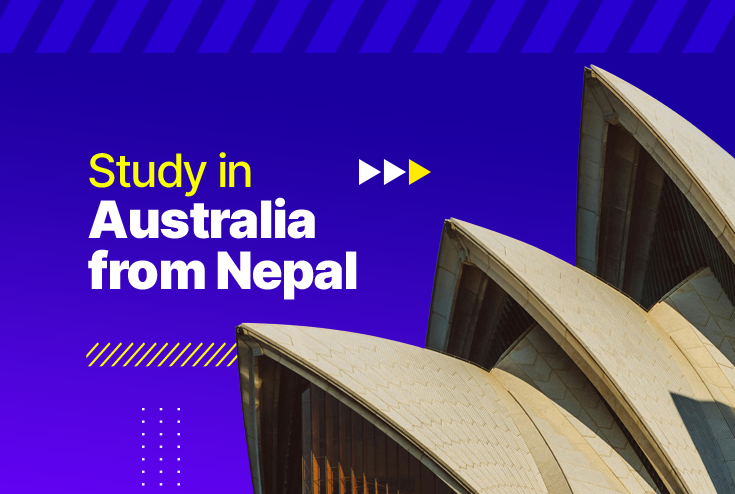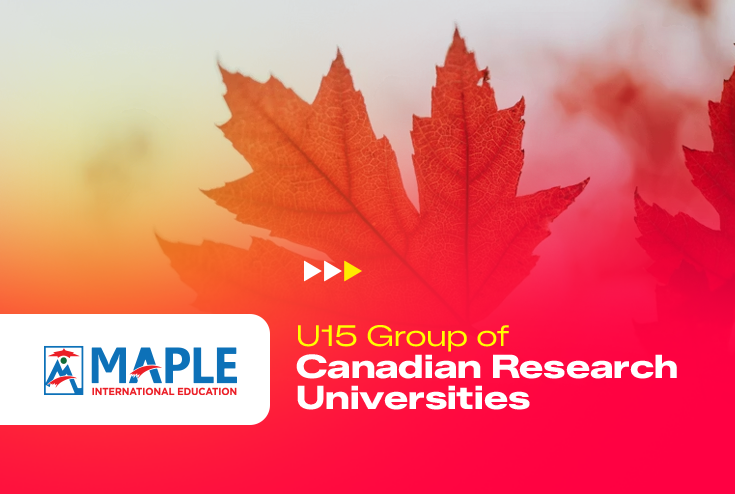
Study in Australia from Nepal: A 2025 Guide
Australia is the leading abroad destination for higher studies among the Nepali students for its top-notch academic curriculum and focus on advanced research in areas like Engineering, Business, and Healthcare.
Whether you are planning to pursue a diploma, undergraduate, postgraduate, or doctoral degrees, Australia offers ample opportunities for international students through its world-class universities, globally-recognized degrees, student friendly and diverse academic environment, and excellent living standards.
If you’re also among those Nepali students who are planning to study abroad in 2025, this blog will guide you on why Australia might be the right destination for you, along with the complete requirements to study in Australia from Nepal.
Table of Contents
- Why Choose to Study in Australia from Nepal
- Popular Courses in Australia for Nepalese Students
- Top Universities in Australia for International Students
- Requirements to Study in Australia from Nepal
- 1. Academic Requirements
- 2. English Language Proficiency Requirements
- 3. Financial Requirements (Genuine Access to Funds)
- 4. Australian Student Visa (Subclass 500) Requirements
- Total Cost to Study in Australia from Nepal
- 1. Tuition Fees
- 2. Living Expenses
- 3. Visa Application & Related Costs
- 4. Miscellaneous Costs
- Scholarship Opportunities for Nepali Students in Australia
- Scholarship Eligibility & Application Tips for Nepali Students
- Work Opportunities in Australia for International Students
- Choose Maple International Education for an Australian Student Visa
- Conclusion
- FAQs
Why Choose to Study in Australia from Nepal
Australia attracts thousands of Nepali students due to its globally respected education system, high standard of living, multicultural society, and excellent post-study opportunities. Here’s why Australia is such a top choice:
1. World-Class Education System
As per the recent QS World University Rankings 2025, Australia is home to nine of the world’s top 100 universities and consistently ranks high in global education indexes. The country offers over 22,000 courses across 1,100 institutions, all regulated by the Australian Qualifications Framework (AQF), ensuring globally recognized degrees and diplomas.
2. Globally Recognized Degrees
Australian degrees are accredited under the CRICOS (Commonwealth Register of Institutions and Courses for Overseas Students) and are accepted and valued worldwide. Whether you return to Nepal, move to another country, or stay in Australia, your Australian qualifications will open doors for diverse job and study opportunities.
3. Post-Study Work Opportunities
Australia offers generous Post-Study Work Visas for international students. In 2025, this remains a strong pull factor for Nepali students:
- 2 to 4 years post-study work rights based on qualification and location
- Additional 1-2 years for regional graduates
- Opportunity to gain skilled work experience or transition to PR
4. Cultural Diversity and Inclusion
Australia is a multicultural and welcoming society, with over 200 languages spoken and people from over 100 countries. Nepali students find it easy to adapt due to:
- Strong Nepali communities in cities like Sydney, Melbourne, Brisbane, and Adelaide
- Nepalese restaurants, groceries, temples, and student groups
- Celebrations of festivals like Dashain and Tihar on campus and in local communities
5. Safe and Student-Friendly Environment
Australia is ranked as one of the safest countries in the world. Universities provide dedicated student support services, including:
- 24/7 security on campus
- Mental health counseling
- Language and academic support
- Accommodation and job search help
The Australian Government also offers the Tuition Protection Service (TPS) to protect international students financially in case their provider fails to deliver a course.
Popular Courses in Australia for Nepalese Students
Based on 2025 education trends, Nepali students are showing interest in:
- Nursing and Healthcare
- Information Technology
- Engineering
- Business and Accounting
- Agricultural Science
- Hospitality and Tourism Management
- Education and Early Childhood Teaching
Each of these courses offers strong employment outcomes and PR prospects in Australia.
Also Read: Master's by Research in Australia from Nepal
Top Universities in Australia for International Students
Australia boasts 9 universities in the QS Top 100 globally, which is among the highest of any country. These are standout institutions for Nepali students seeking quality education, strong research, and an excellent global reputation:
Requirements to Study in Australia from Nepal
To study in Australia as a Nepali student, you must meet a set of academic, language, and financial requirements. Each step ensures you are prepared for the academic rigors, cultural experience, and legal responsibilities of studying abroad.
Let’s explore each requirement in detail:
1. Academic Requirements
Academic qualifications depend on the level of study (Diploma, Bachelor’s, Master’s, or PhD). Here’s what most Australian institutions look for:
- For Diploma / Vocational Education and Training (VET)
- Completion of Higher Secondary Education (10+2 / A-Levels / equivalent)
- Minimum GPA 2.70 (requirement varies by institution)
- Some programs may require Math or Science background
- For Bachelor’s Degree
- Completion of Higher Secondary Education (10+2 / A-Levels / equivalent)
- Minimum GPA 2.80 (requirement varies by institution)
- Certain programs (Engineering, Nursing, Health Sciences) require specific subjects and higher grades
- For Master’s Degree
- Recognized Bachelor’s degree (3 or 4 years) in a relevant field
- Minimum 55–65% or GPA 3.0 (requirement varies by institution)
- Some Master’s by Research programs require a strong academic background and research proposal
- For Doctoral / PhD
- Master’s degree or Honours Bachelor’s with research experience
- Strong academic background and published research (in some cases)
- Research proposal and supervisor acceptance required
2. English Language Proficiency Requirements
All international students must demonstrate English proficiency through any one of the approved tests:
Minimum English Requirements to Study in Australia from Nepal:
Note: Some universities and colleges may have higher or lower score requirements depending on the course (e.g., Nursing, Teaching, or Law require higher scores). Always check course-specific requirements of your preferred university.
3. Financial Requirements (Genuine Access to Funds)
The Australian government requires evidence that you or your sponsor(s) can financially support your education and living costs.
Minimum Financial Evidence Required for 1 Year in Australia (as of 2025):
You must show:
- Bank Balance Certificate & Account Statement (usually 6-12 months old)
- Income Documents (tax clearance, bank statements, income certificates and other relevant documents depending on the income type)
- Loan Sanction Letters, Mortgage Deed, and Disbursement Letter & Account Statement (if educational loan used)
- Sponsor's Relation Proof and Financial Affidavit
Recommended Total Proof: AUD 45,000–70,000 depending on course, university, and your dependents.
4. Australian Student Visa (Subclass 500) Requirements
To obtain a student visa, Nepali students must satisfy several conditions under the Genuine Student (GS) criteria.
Key Visa Requirements:
- Confirmation of Enrolment (CoE) from an Australian institution
- Valid Passport
- GS Statement: A written statement explaining your personal circumstances, why you want to study in Australia, your ties to Nepal, and your intent to return
- OSHC (Overseas Student Health Cover) for the entire duration of the stay
- Income Evidences
- Proof of Funds (either bank balance or educational loan)
- English Proficiency Proof
- Academic Transcripts and Certificates
- Medical Clearance
- Relationship Proof Documents (with your sponsors)
- Tax Clearance Documents
- Student Visa Application Fee: AUD 2,000
Visa processing time: Typically 4–6 weeks (may vary by case)
Total Cost to Study in Australia from Nepal
Studying in Australia is a life-changing opportunity, but it requires careful financial planning. The total cost to study in Australia from Nepal can range from NPR 4,000,000 to 6,500,000 per year, including your tuition and living expenses. However, this may vary depending on your chosen course, university, and location.
Let’s break down the complete cost a Nepali student is likely to incur when pursuing higher education in Australia.
1. Tuition Fees
2. Living Expenses
The Department of Home Affairs requires evidence of at least AUD 29,710 to cover living costs for one year. Actual expenses may vary depending on city and lifestyle.
Cheapest cities: Adelaide, Hobart, Darwin
Costlier cities: Sydney, Melbourne, Brisbane
3. Visa Application & Related Costs
4. Miscellaneous Costs
Explore the Total Cost of Studuing in Australia from Nepal in detail
Scholarship Opportunities for Nepali Students in Australia
Australia offers a wide range of scholarships, bursaries, and financial aid programs to international students, including those from Nepal. These scholarships could be government-funded, the university’s financial aid, or even organisation-sponsored. These scholarships aim to attract top talent, support deserving students, and promote global diversity.
1. Australian Government Scholarships
These are some of the most prestigious and competitive scholarships offered by the Australian government to international students, including those from Nepal.
Australia Awards Scholarships (AAS)
Funded by: Department of Foreign Affairs and Trade (DFAT)
Eligibility: Bachelor’s graduates for postgraduate (Master’s) study from eligible developing countries (including Nepal)
Covers:
Full tuition fees
Return airfare
Living stipend (AUD 1,400–2,000/month)
OSHC (Health Cover)
Introductory Academic Program
Application Timeline: February to April annually
Very competitive – requires strong academics, leadership potential, and a development-focused study plan.
Website: About Australia Awards Scholarships
2. University-Specific Scholarships
Most Australian universities offer merit-based and need-based scholarships to international students, including entry-level discounts, faculty-specific awards, and research grants.
Popular University Scholarships
Most of these are automatically assessed during the application process, but some require a separate application or statement.
3. Research Scholarships (Master’s by Research & PhD)
If you’re pursuing a research degree in Australia, especially a PhD, you’ll find many scholarships that cover tuition and living expenses.
Top Research Scholarships:
Research Training Program (RTP) – by the Australian Government
Covers full tuition and living stipend (~AUD 32,000/year)
Open to international students via Australian universities
University-specific RTPs: Offered by most Group of Eight (Go8) universities
HDR Scholarships: Higher Degree by Research-specific awards
These scholarships are highly competitive and often require a strong academic record, research proposal, and supervisor endorsement.
4. TAFE/VET Institution Scholarships
While fewer than universities, some Technical and Further Education (TAFE) institutions and private colleges offer limited scholarships to outstanding international students.
TAFE NSW – Scholarships of up to AUD 2,000–3,000
Holmesglen Institute – International Student Scholarships
Chisholm Institute – Entry-based bursaries
Scholarship Eligibility & Application Tips for Nepali Students
To increase your chances of winning a scholarship:
Academic Excellence: Maintain a high GPA and provide translated and verified transcripts.
English Proficiency: High IELTS/PTE/TOEFL scores are often preferred.
Strong SOP: Write a compelling Statement of Purpose showing motivation, goals, and how you will contribute to Nepal after graduation.
Extracurriculars & Leadership: Highlight your leadership, volunteering, or community service.
Early Application: Many scholarships have early deadlines ao, apply 6 to 12 months in advance.
Work Opportunities in Australia for International Students
Australia is one of the most student-friendly countries when it comes to employment opportunities during and after study. As an international student, you’re legally allowed to work part-time during semesters and full-time during breaks, helping reduce financial burden and gain valuable experience.
1. Work While Studying
- International students can work up to 48 hours per fortnight (two-week period) during the academic session.
- When universities close for summer/winter holidays or mid-semester breaks, work hour restrictions are lifted. Students can work full-time during these periods.
- Popular jobs for students:
- Barista / kitchen hand in the hospitality sector.
- Sales assistant / cashier in retail stores
- Office / home cleaner
- Office assistant / receptionist
- Support worker in child care / age care
- Minimum wage in Australia (2025) is AUD 24.95 / hour.
2. Post-Study Work (Temporary Graduate Visa – Subclass 485)
Once you complete a recognized qualification in Australia, you may be eligible for a Temporary Graduate Visa that allows you to live and work full-time in Australia for 2 to 4 years.
- Bachelor’s Degree: 2 – 4 years
- Master’s Degree: 3 – 5 years
- PhD: 4 – 6 years
Regional areas (e.g., Darwin, Adelaide, Gold Coast) offer extended PSW durations and extra migration points.
Choose Maple International Education for an Australian Student Visa
At Maple International, we’ve helped hundreds of students successfully transition from Nepal to Australia.
Here's what makes us your ideal partner:
Experienced Counselors
University Application Support
SOP & GTE Guidance
Interview Preparation
Visa Filing Assistance
Pre-Departure Orientation
Contact us today for a free consultation and personalized guidance for admissions!
Conclusion
Studying in Australia from Nepal opens doors to a global education, life-changing experiences, and career growth. With the right guidance and preparation, your dream of studying in Australia can become a reality. Start early, choose wisely, and connect with us to ensure a smooth journey.
FAQs
1. How much does it cost to study in Australia from Nepal?
The total cost to study in Australia from Nepal can range from NPR 4,000,000 to 6,500,000 per year, including your tuition and living expenses. However, this may vary depending on your chosen course, university, and location.
2. How much GPA is required to study in Australia from Nepal?
To study in Australia, you will need 2.80 GPA or higher for the bachelor's and 3.0 GPA or higher for the master's or doctoral degree. This requirement may vary depending on your chosen course and university.
3. Can I go to Australia without IELTS?
No, you must prove your English language proficiency for the Australian visa from Nepal. For that, you can either submit the IELTS scores or other alternative test scores like PTE, TOEFL, etc.
4. Is a 2 year gap accepted in Australia?
Yes, a 2 year gap is accepted in Australia, especially for the master's degree. However, it's crucial to provide valid and documented reasons like; work experience, training, internships, etc.
5. What is the age limit for studying in Australia?
There is no specific age limit for studying in Australia.
Also Read:
Study in UK from Nepal: A Guide 2025
Best Consultancy in Nepal for Australia in 2025




